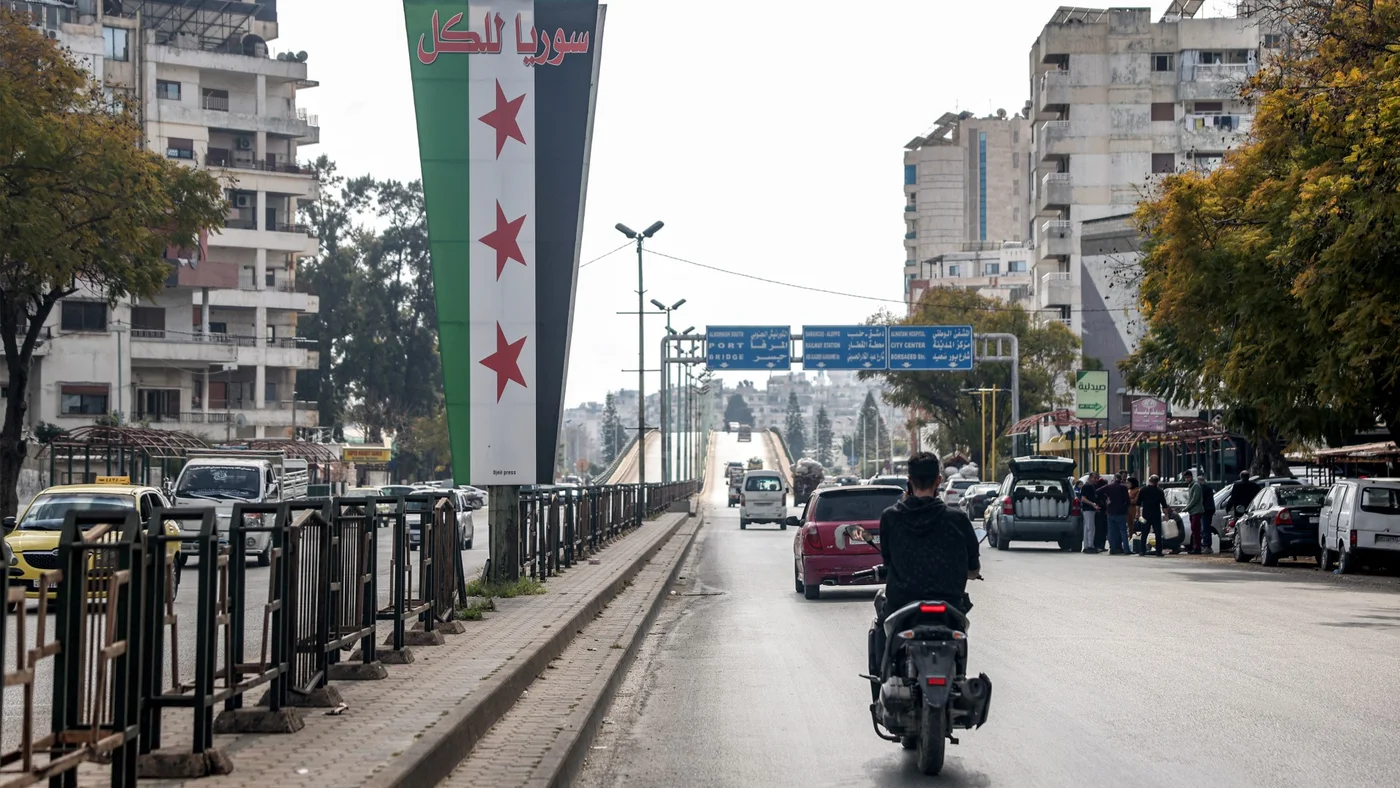
While Trump announces the end of all economic restrictions, Mee analyzes how sanctions aggravated the devastation of war
There were scenes of joy when President Donald Trump announced on Tuesday the survey of US sanctions to Syria, which lasted more than 45 years.
“My whole family was on the streets,” Daraa’s activist Al-Amari told Nedal, currently residing in Germany to Middle East Eye. “There were great celebrations in all Syrian cities.”
Since the fall of the government of Bashar al-Assad on December 8, the new Syrian administration led by Ahmed Al-Sharaa has struggled to rebuild the economy devastated by war due to paralyzing sanctions.
Although the European Union and the United Kingdom partially suspended restrictions earlier this year, Washington kept them in force.
In March, the US made a number of demands on the Syrian government to start a process of relief from sanctions. Among them was the prohibition of Palestinian political activity and the unification of the Syrian army – measures that the new Syrian government had already taken.
Many expected a slow bargaining process for concessions. But then, during his trip to Saudi Arabia, Trump announced, “I will order the end of sanctions against Syria to give them a chance of greatness.”
He said that “all” the sanctions would be suspended after pressure from Saudi heir prince and Turkish President.
“Good luck, Syria. Show us something special,” said Trump.
Mee analyzes how sanctions aggravated the economic devastation of the civil war and what could happen in the coming months.
What sanctions were imposed on Syria?
The US sanctions to Syria dates from 1979, when the country was under the government of Hafez al-Assad.
At the time, Washington designated Syria as a “sponsoring state of terrorism,” issuing a series of financial restrictions, a ban on US foreign aid and a weapon embargo.
Other restrictions were imposed by the Ronald Reagan government in 1986, including the ban on Syrian aircraft landing in the US.
In 2004, George W. Bush’s government accused Syria – then governed by Hafez’s son, Bashar – of having weapons of mass destruction, supporting militant groups in the region (including Hezbollah and Hamas) and destabilizing Iraq and Lebanon.
It further limited economic interactions with Syria, prohibiting most exports and freezing the assets of various individuals and entities.
The broader set of global sanctions occurred after 2011, when the Assad government brutally repressed peaceful protests against the government, triggering a civil war.
In response to war crimes and serious human rights violations, the EU has froze the goods of state -linked individuals and prohibited their admission to Europe.
It also prohibited the purchase, sale and export of goods in sectors that can be used against civilians, including technology, oil and gas.
The US went even further, prohibiting all commercial ties, including the re -export of US goods and services to Syria, except for food and medicines.
In 2019, under the Caesar Syria Civil Protection Act – named after “Caesar”, a Syrian military dertor who smuggled tens of thousands of photos showing torture and deaths in arrests – secondary sanctions were introduced.
This allowed the US to punish companies from other countries if they conducted transactions with Syrian companies and entities sanctioned.
The UN did not impose sanctions on the Syrian state, largely due to Chinese and Russian vetoes on the Security Council, but designated several groups as “terrorist actors.”
Among them was a front al-Nusra, the predecessor of the Hayat Tahrir Al-Sham (HTS), which would later lead the offensive that overthrow Assad in December 2024.
USA, EU, UK and other countries have specifically designated HTS as a terrorist organization.
Its leader, Sharaa – previously known by the name of war Jolan – was added to the list of terrorists specially designated by the US in 2013. A $ 10 million reward was later added by his head.
How did sanctions impact the lives of Syrians?
“All areas of Syrian’s lives have been impacted by sanctions,” Benjamin Febive, Syrian’s political economy expert to Mee.
Febru, senior research analyst at Karam Shaar Advisory, said that, contrary to what is often reported, it was not the sanctions themselves that destroyed Syria’s economy.
“The impact of sanctions was mainly from preventing the economy from recovering from war and destruction,” he said.
This included physical destruction of vital areas, such as water or energy infrastructure, which could not be rebuilt.
“The most basic services are not functional, such as heating, electricity and transportation,” said Amari.
“This is due to the deprivation of the Syrian people by the Assad regime and the sanctions that prevented Syria from importing oil.”
Amari added that health and education were also severely affected by war and sanctions.
Although there were exceptions to humanitarian aid, the breadth of sanctions caused Syrians to suffer due to the complexity of compliance with the rules.
Most financial institutions refused to negotiate with Syria, fearing secondary sanctions, which interrupted aid operations and made it difficult to access Syrians to basic services.
People celebrate at the Omaid Square in Damascus, after the decision of US President Donald Trump of suspending sanctions to Syria on May 13, 2025 | BAKR AL-KASSEM/AFP
“Syria has been excluded from the international banking system,” Omer Ozkizilcik, a non -resident member of the Syrian project at Atlantic Council, to Mee. “Therefore, no investor was able to transfer your money to Syria and remove it from there by legal and transparent means.
“Secondly, due to secondary sanctions, many arranged nations, such as Arab states, Turkey and European states, who wanted to help Syria rebuild and who wanted to invest in Syria, failed to do so.”
As a result of war and sanctions, more than 90% of Syria’s 23 million inhabitants live in poverty.
The economy shot 84% between 2010 and 2023, according to the World Bank, based on night light emissions (an indicator often used for economic activities in which data is incomplete).
The Syrian Libra fell from 47 per dollar before the war for a black market rate of 13,000 in early 2025.
What comes next to the Syrian government?
Since the new Syrian Administration under Sharaa has taken power, it failed to perform the level of institutional and economic reforms necessary due to sanctions.
“Sanctions prevent the economy from working properly,” said February. “And a government without money is an powerless government that can do nothing.”
This includes the inability to rebuild infrastructure, access international financing and import essential goods.
Amari said that as soon as the sanctions were suspended, urgent priorities would be “to provide electricity, oil and gasoline to the population and provide modern medical equipment.”
He added that job opportunities with appropriate salaries should be created and essential resources should be provided to students at all levels.
The UN estimates that Syria’s reconstruction will cost $ 250 billion, although analysts said the actual value will probably be lower.
“We know from other areas of conflict that the reconstruction was made with fewer resources than the United Nations expected,” said Ozkizilcik. “It is necessary to consider the will of the people, [que] It is determined to rebuild and rebuild your country. ”
He noted that although the value could be less than $ 250 billion, it would still be a huge amount.
“The European nations and the Arab states will be the main sponsors of Syria’s reconstruction,” he said, adding that what was once humanitarian aid would now be development assistance.
Febive warned that it was not yet clear exactly which restrictions would be suspended.
“We don’t know which sanctions will be suspended,” he said. “There are many, many sanctions imposed on Syria by the US that are still in force. Some of them date from 1979.”
One of the areas that remains obscure is the prospect of the HTS, which has now been dissolved.
“Theoretically, it can be argued that there is no longer the presence of HTS as an organization and that this definition of terrorism is obsolete now,” said Ozkizilcik.
He said the alternative would be the UN Security Council to agree to remove the group from the list, which may be possible as all members, including Russia and China, have established relations with the Sharaa government.
Sharaa’s own designation also seems obsolete now, especially after he squeezed Trump’s hand on Wednesday, who called him a “young and attractive guy” with a “strong past.”
For now, the Syrians are hopeful that the economic recovery, which has been built for decades, is finally within our reach.
“The Syrian people are really very happy at these times,” said Amari.
Originally published by Mee on 15/05/2025
Por rayhan uddin
Source: https://www.ocafezinho.com/2025/05/16/como-as-sancoes-afetaram-a-vida-na-siria-e-o-que-acontece-depois/

